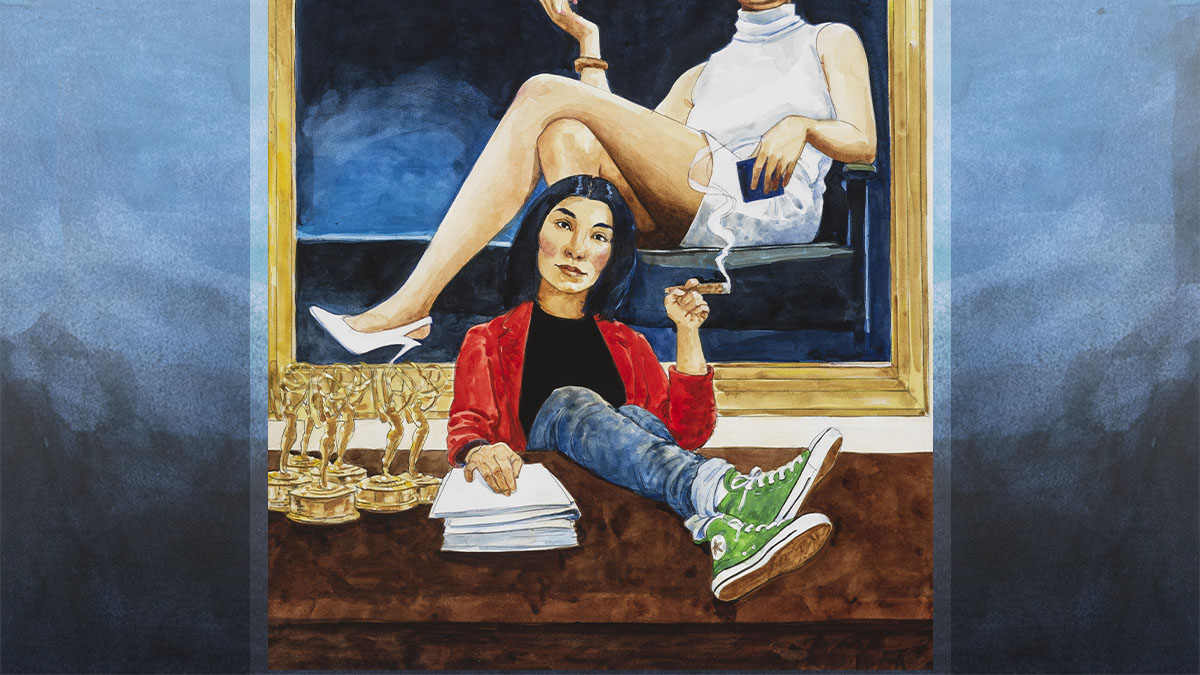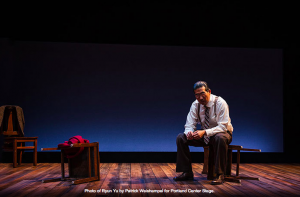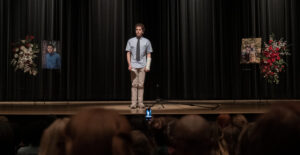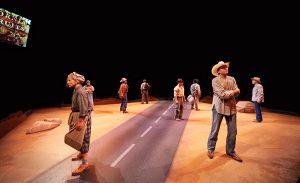“It’s show business, not show history.” Those brutal words from a Hollywood mogul to an aspiring writer perfectly embody the thesis of Exclusion (2023), a play that investigates who gets the power of the pen and who gets silenced through a skillful incorporation of critical comedy.
Exclusion is the tenth production in Arena Stage’s Power Play series—a collection of performances centered around the intersection of power and politics. Written by Kenneth Lin (Netflix’s House of Cards (2013), Star Trek: Discovery (2017)), the comedy follows Katie (Karoline), a historian whose book about the Chinese Exclusion Act of 1882 is greenlit for a historical fiction TV series. She’s thrilled about the opportunity to tell this often overlooked history to a greater audience, yet her excitement is halted when she’s forced to grapple with “the struggle between what’s true and what sells.” With a brisk 90-minute runtime, the play is quick, emotional, and powerful, leaving the audience with both answers to the history and impact of Chinese exclusion and more still-lingering questions about how to properly navigate representation in the modern era.
Exclusion’s excellence lies in how effectively the play harmonizes a nuanced discussion of identity and representation with lighthearted and relieving humor. Walking the thin line between complementing and trivializing important struggles with laughter is a difficult task, but Lin masterfully combines the astute, observational essence of comedy and sincerity in a script that is densely packed with emotion, truth, and wit. In Exclusion, truth and humor are two sides of the same coin—that veracity lends itself to the success of the play as both a comedy and commentary.
The first scene introduces the main conflict: Harry (Josh Stamberg), the TV series’ producer, announces to Katie that, though the show’s been greenlit, he had to rewrite the entire pilot. He tries to reassure Katie, reminding her that her name is still credited and the show is still based on her book, but she’s unable to come to terms with the edits Harry made—the script remaining under her name almost makes it worse. Most notably, the lead character has been changed from a seamstress to a prostitute, and rather than characters being lynched as they would’ve been in 1882, they escape in a dramatic, awe-inspiring kung fu spectacle—historically accurate, of course. The unequal power dynamic at work is highlighted from the get-go through the blocking: with Harry standing and Katie sitting, the audience doesn’t even really get a clear glimpse of Katie’s face until the very end of the conversation.
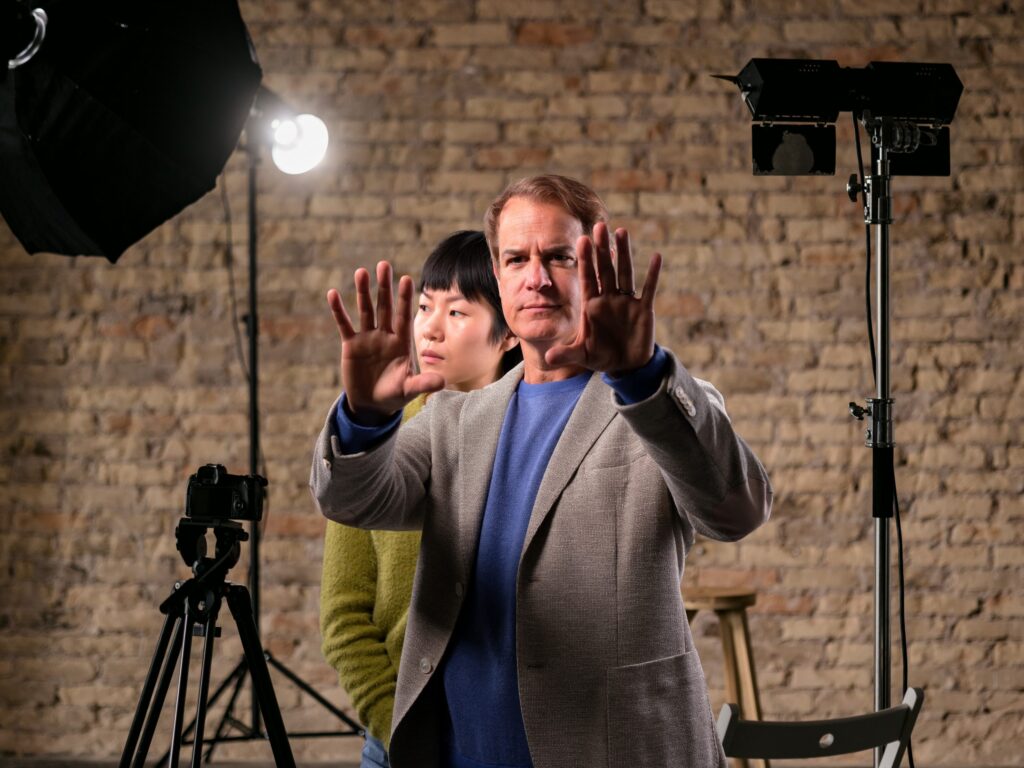
Photo by Tony Powell. Courtesy of Arena Stage. Harry (Josh Stamberg) and Katie (Karoline)Photo by Tony Powell. Courtesy of Arena Stage.
After meeting with Harry, Katie returns home to her partner, Malcolm (Tony Nam), who is a creative in his own right: Malcolm is a documentary filmmaker working on a project about the role of Chinese immigrants in building the Transcontinental Railroad. The two moved to Los Angeles together to chase their dreams of making art that tells stories authentic to their history and heritage. As Katie recounts the contents of her conversation with Harry, Malcolm, realizing the potentially hostile circumstances she has put herself in, asks Katie to drop the endeavor and look elsewhere for opportunities. We’re served some deliciously satisfying one-liners throughout the play, and it’s in this scene, we get one of the most enjoyable ones: “Is he any type of Asian?” “Caucasian.” We laugh, and yet also immediately sense the deep-seated anger in response to the infuriatingly annoying truth.
“[Kenneth] very artfully creates these ways in which emotionally, you go through the journey of this play and, at one point you’re laughing and the next point the reality of the Chinese Exclusion Act, of the circumstances that Katie and Malcolm find themselves in, really hit home,” Nam told the Voice.
Masterfully weaving humor into the fabric of its social commentary, Exclusion resonates in its honesty. Rather than providing pure escapism, each joke is rooted in real and valid frustration. The joking never detracts from the seriousness and magnitude of the character’s challenges; if anything, the play makes the argument that in the fight for representation, some circumstances are so absurd and unbelievable that they should be made fun of.
“The comedy really serves to highlight the ridiculous circumstances folks find themselves in when it comes to positions of power, of who gets to control a story and how that negotiation, how that manipulation happens. There are certainly aspects of that that are bizarre and can be very funny,” Nam continued.
“I think the best kind of comedies are grounded in some sort of hard truth, right? Comedy is playing the truth of the moment,” Karoline told the Voice. In embracing the comical nature of the circumstance, Exclusion exposes the truth in its wretched entirety.
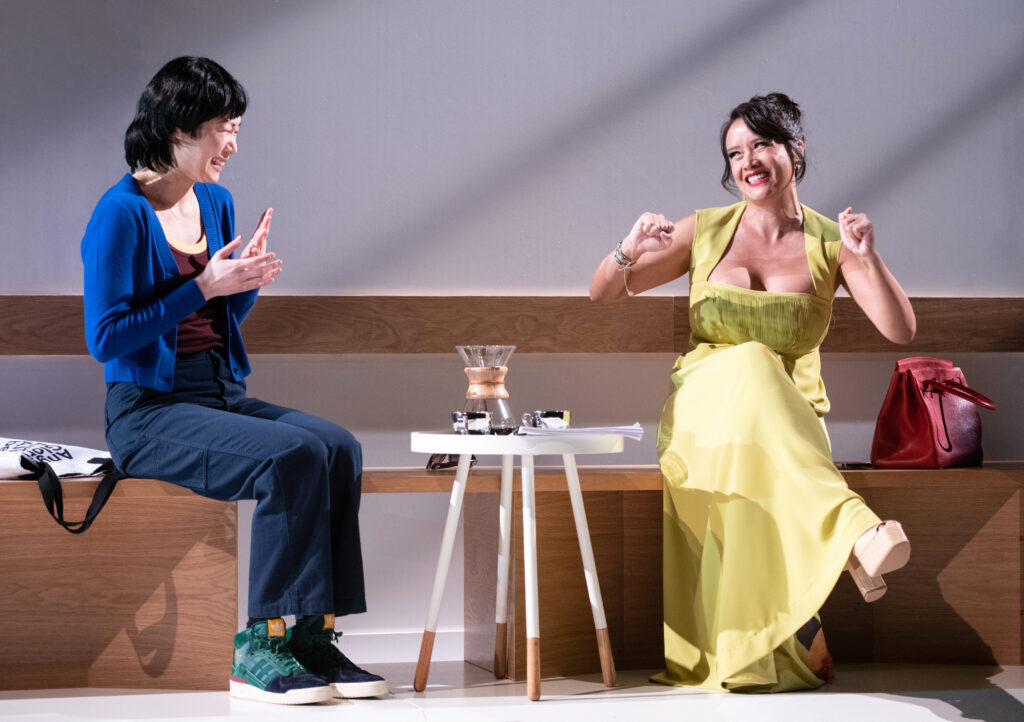
Photo by Margot Schulman. Courtesy of Arena Stage. Katie (Karoline) and Viola (Michelle Vergara Moore)Photo by Margot Schulman. Courtesy of Arena Stage.
Karoline and Nam echoed similar sentiments when it came to their first impressions of the script’s time and place. They had expected a darker, heavier play, potentially set during the period of the Chinese Exclusion Act, yet quickly realized that Lin’s chosen setting of modern-day Hollywood allows the play to address an important history while simultaneously highlighting struggles of media representation today.
“[Exclusion] couches the history of the Chinese Exclusion Act within this more contemporary story about the politics involved in show business and the ways in which Hollywood and other aspects of the entertainment industry play this role in deciding what stories get told and who gets to tell them,” Nam said.
Using Hollywood as a background can sometimes lead to a minimization of a work’s weight. A place known to be shallow and overdramatized can engender a less serious viewing mindset, and the glitz and glamour can inundate the characters’ challenges. Yet in Exclusion, the setting only magnifies the play’s power.
“The investment and the heart and the struggle of these characters are just as deep. That was something that I found while doing it, and that was really exciting because it made it a little bit larger than life,” Karoline said.
The play is funny where it needs to be funny, but it also makes space for the bold expression of pure generational pain and unrelenting anger. In a pivotal and climactic scene, Katie challenges Harry on why the role change from seamstress to prostitute was made at all, and Harry, beating around the bush trying to defend himself, claims that violence against a prostitute would be better received by the public than a seamstress—implying a prostitute’s lynching was more justifiable because she more believably “earned it” on the basis of her identity.
In response, Katie launches a tirade of what Karoline calls “some really important and vicious truths.” Katie unpacks each one of Harry’s implicit biases and prejudices, laying them out in front of him without reserve. She points out the privilege he holds, his lack of respect for her work, and the terrible implications of the things he’s written. Her outburst never relents, the momentum snowballing until both are shocked into silence.
The show later reverts the character to a seamstress, but it’s a far cry from victory—the series was transformed into an action show where the seamstress pulls daggers out of hair and sews attackers’ mouths shut. With this second round of revisions, it becomes clear that Katie was destined to lose this battle, any semblance of historical accuracy traded for dramatic entertainment value.
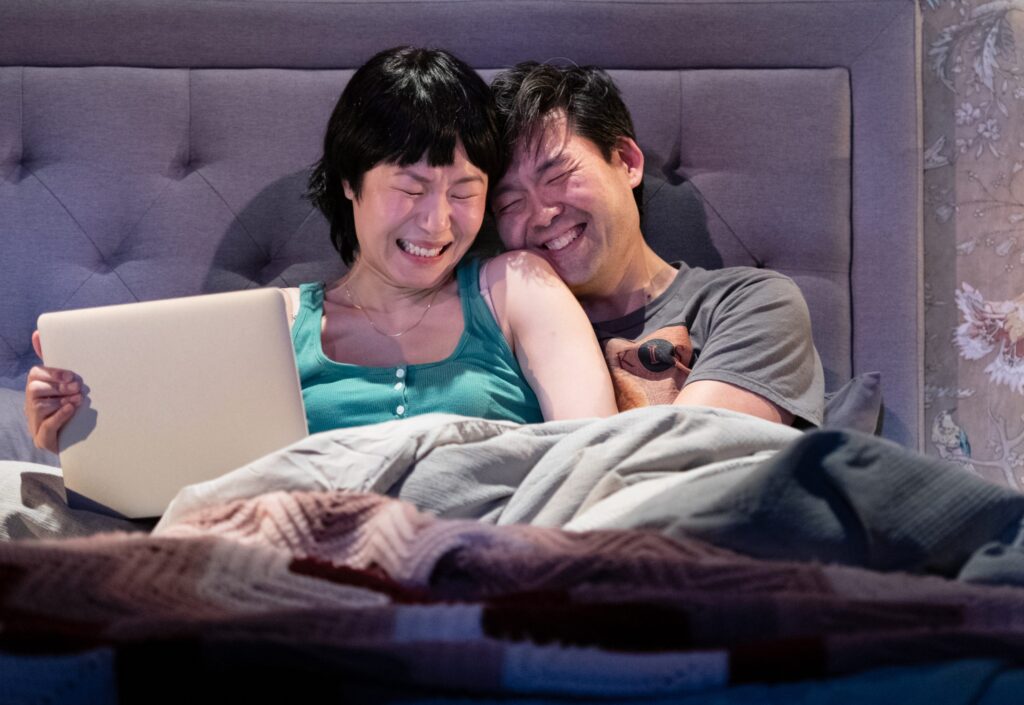
Photo by Margot Schulman. Courtesy of Arena Stage. Katie (Karoline) and Malcolm (Tony Nam)Photo by Margot Schulman. Courtesy of Arena Stage.
Katie’s not the only one wrestling with the impact of perpetuating stereotypes through media. In speaking with the show’s lead, Viola (Michelle Vergara Moore), who had come planning to tell Katie how enthused she was about the role, Katie projected her frustrations about the canonical portrayal of Asian women as prostitutes in her first words. She had thought Viola would share her sentiments, but it hadn’t even crossed the actress’s mind. Consequently, the conversation left Viola forced to reckon with how she’s only played into such stereotypes throughout her career, and whether she could in good faith still take on the role.
The epilogue sees Katie tying up her loose ends with Viola through an extended dialogue in Cantonese—no translation provided. While most of the audience wasn’t able to appreciate the full content of the conversation, the sincerity and intention of the moment rang loud and clear, transcending language barriers. In fact, there was something delicately beautiful about a theater full of people listening so intently to words they don’t understand.
The recurring use of Cantonese is a testament to the play’s commitment to paying homage to heritage. While Katie previously told Malcolm to make his documentary in Mandarin, arguing that it would be easier and more marketable given Mandarin only has four tones while Cantonese has nine, Malcom uses Cantonese regardless. Katie ultimately exclaims that he was right all along; this was a story destined to be told in the dialect. This final scene is the play’s emphatic reminder that language choice in storytelling is incredibly important and must be deliberate—sometimes, the hidden barriers in translation simply cannot be overcome.
Katie’s parting words with Harry are equally meaningful. Suddenly realizing he never did, Harry asks Katie what her parents did for a living. She reveals, simply, that “my mother was a seamstress.” The gravity of that statement sets in almost immediately—nothing more is said, and nothing more has to be said. It’s clear that Katie has been fighting to tell a part of her own story to the world, but it’s unclear whether she’s ultimately made peace with the show. Even in the last couple of scenes, Katie struggles to communicate and reconcile her conflicting feelings about the project: she admits to Viola that she enjoys it with guilty pleasure as a viewer, but fails in pretending to love it as something that’s supposed to be under her name yet never really was.
Katie has found her own closure working on Malcolm’s Railroad documentary, writing in the scenes she wanted but couldn’t have within the show and making something that’s clearly authentic and personally meaningful. Yet there’s a sense of deliberate incompleteness to this ending: the lights dim with Katie staying behind on set, watching a worker clean up fake blood that was spilled during filming. Heavy questions of whether what Katie’s doing is enough, truthful, and right hang in the air—questions Exclusion asks its audience members to individually reckon with as well.
“The story that Katie and Malcolm go through in this play, I still believe that those things still happen,” said Nam.
Much like how Katie and Malcolm’s scripts haven’t come to an end yet, neither has the fight for genuine representation. When speaking with the Voice, Karoline and Nam drew parallels between the play and their own experiences forging careers in theater, making Exclusion a gratifying project for both. The existence of such a play and the phenomenal cast and crew behind it signals a pivotal moment of change and progress for AAPI representation in media.
“It’s this beautiful thing, Asian people, people of color thinking about each other and doing the work, and, one day, the thing gets made,” Karoline concluded.
Exclusion is running at Arena Stage from May 5 to June 25: get your tickets here.


